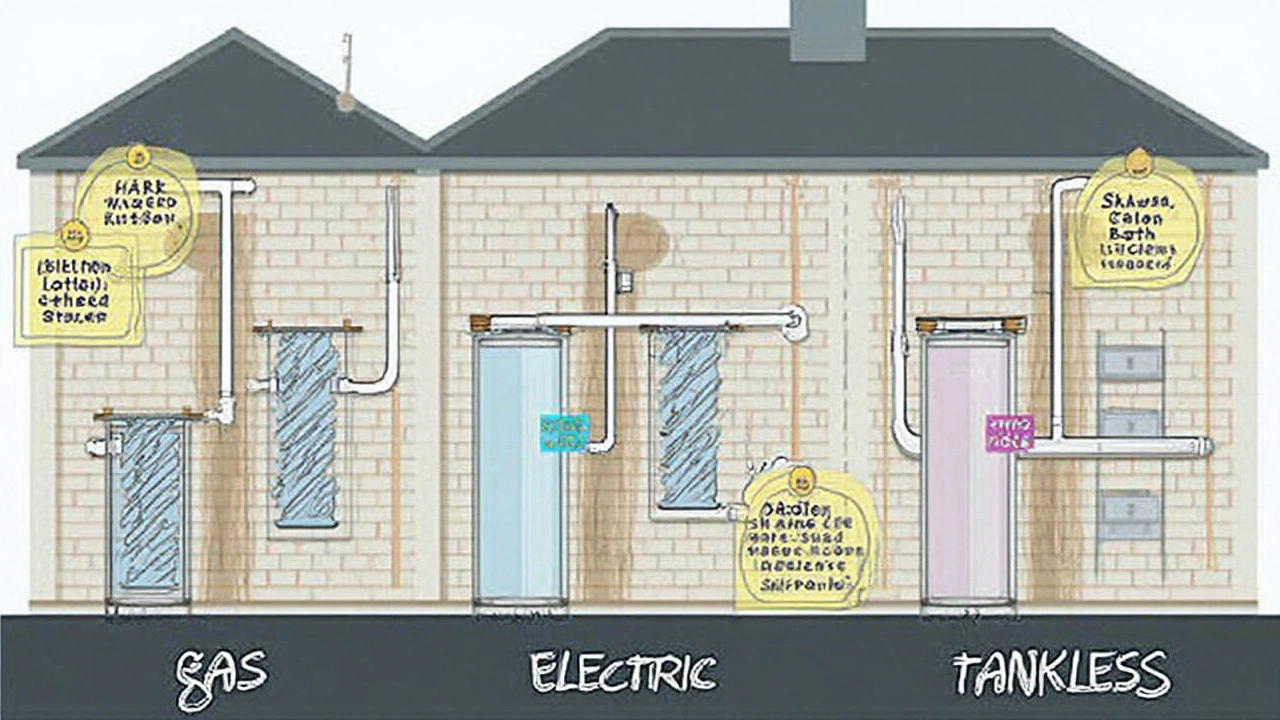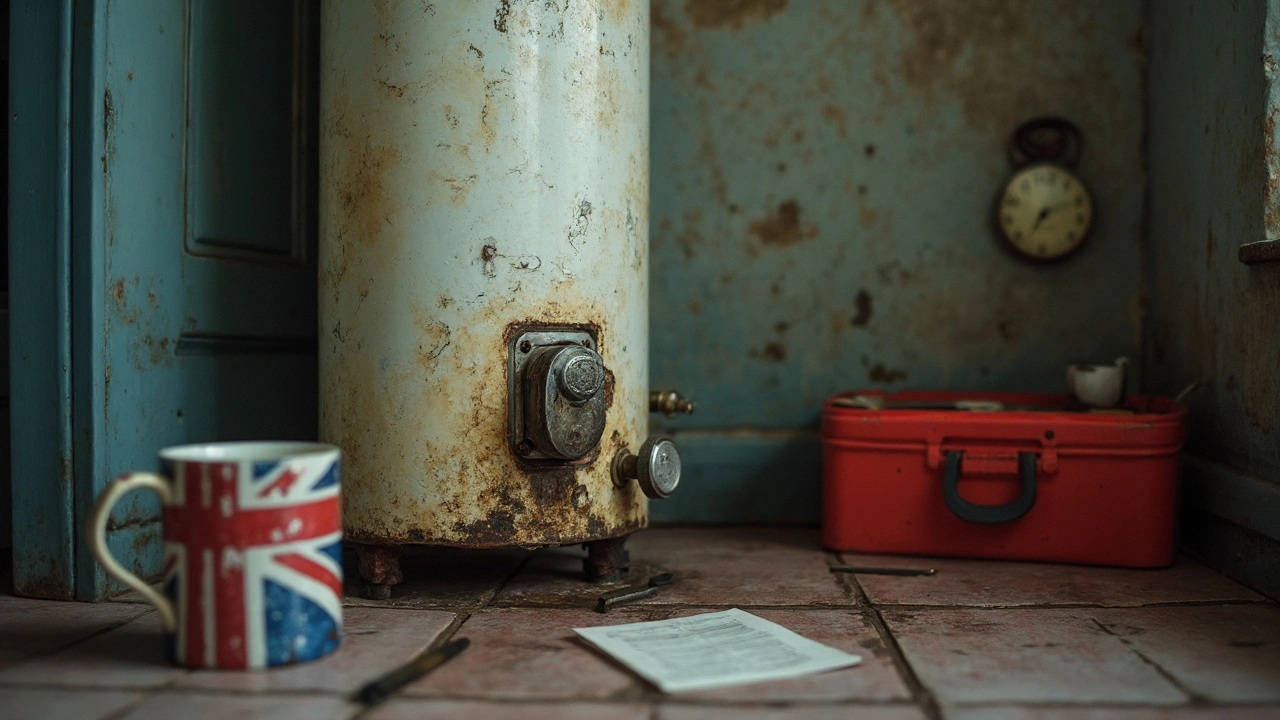If you’re like most folks, the only time you even think about your water heater is when you climb into a cold shower and start regretting all your life choices. Nobody wants to deal with freezing water at 7am or a leak that catches you off guard. So, how long is your water heater really supposed to last before you’re stuck calling for repairs—or worse, shopping for a new one?
A typical water heater doesn’t last forever. Most standard tank models—those big round things humming in the garage or basement—stick around for about 8 to 12 years. If you have a tankless system, you might squeeze out closer to 20 years if you treat it well. But even with the best intentions, things like your water quality and how much you actually use hot water mess with that number.
- What’s the Average Lifespan of a Water Heater?
- Gas vs. Electric: Does Type Make a Difference?
- Factors That Speed Up (or Slow Down) Water Heater Aging
- Easy Tips to Stretch Out Water Heater Life
- How to Spot When Yours Is on Its Last Legs
What’s the Average Lifespan of a Water Heater?
If you’re trying to figure out when your water heater’s going to call it quits, you’re not alone. Most folks don’t realize there’s an actual timer ticking down the years for that tank in the closet or basement.
On average, traditional tank water heaters (that’s the kind most people have), last between 8 and 12 years. That’s what manufacturers, plumbers, and even those boring owner’s manuals agree on. A tankless heater is a different beast—it usually keeps the hot water coming for about 18 to 20 years, sometimes longer if you take good care of it. And if you’re old-school and have a heat pump water heater playing double-duty, expect somewhere between 10 and 15 years on average.
| Type | Average Lifespan (Years) |
|---|---|
| Tank (Gas/Electric) | 8-12 |
| Tankless | 18-20 |
| Heat Pump | 10-15 |
| Hybrid | 10-15 |
Here’s the thing: that water heater lifespan isn’t a guarantee. Think of it as the average, not a promise. If you live somewhere with hard water, for instance, those minerals sitting at the bottom of the tank start eating away at the insides. That means a tank heater could tap out after just 6 or 7 years. If you’re keeping up with yearly maintenance or have a water softener, you might see the tank outlive the average without any drama.
Are you curious when your water heater is likely to expire? Look for the installation date on the sticker—that’s your countdown day one. If you can’t find it, most units have a serial number that tells you when they were built. Google your brand and how to read its serial number if you’re stumped.
As these numbers show, just because your water heater hasn’t leaked onto the floor yet doesn’t mean it’s not living on borrowed time. Being aware of your heater’s age gives you a leg up—you can plan your next replacement before you’re hit with a cold surprise.
Gas vs. Electric: Does Type Make a Difference?
If you're staring at your utility bill or wondering why your neighbor’s water heater is still kicking while yours is acting up, it’s probably because not all water heaters are built the same. One big difference? The energy source. Gas and electric water heaters have different lifespans, habits, and quirks.
Standard gas water heaters usually last around 8 to 12 years. Electric ones can stretch it a bit—think 10 to 15 years on average. This isn’t just a random quirk. Gas units deal with open flames, which means more wear and tear from heat and combustion. Electric units heat water with elements, so there’s less direct stress inside the tank.
| Type | Typical Lifespan (Years) | Common Problems |
|---|---|---|
| Gas | 8 - 12 | Pilot light issues, burner failure |
| Electric | 10 - 15 | Heating element burnout, thermostat failure |
But hang on—cost of use and repair show another side. Gas heaters tend to heat water faster and cost less month-to-month, but electric heaters are more efficient. They convert almost all their power into hot water, while gas heaters lose some heat through venting.
- If you want faster hot water recovery (like after all three kids take showers before you), gas is usually the winner.
- If you prefer less maintenance and a quieter machine, electric might fit better.
The biggest thing here is that your water heater choice actually does matter. And whatever you pick, regular maintenance keeps both types alive longer. Tankless options? That’s a whole separate ballgame—but even among tank models, the differences between gas and electric are worth knowing.

Factors That Speed Up (or Slow Down) Water Heater Aging
Some water heaters just seem to give up early, while others chug along way past their "best before" date. So what actually ages your water heater faster—or, with some luck, gives it a longer life?
Here’s what really matters:
- Water quality: If your home has hard water (packed with minerals like calcium and magnesium), those tiny mineral deposits build up inside the tank over time. This leads to sediment at the bottom, making your heater work harder—and that means a shorter lifespan. If you’ve ever heard popping sounds from your heater, that’s probably sediment saying hello.
- Usage: Families that power through multiple hot showers, wash loads, and dish cycles every day will see their water heater age faster compared to someone living alone who barely uses it.
- Maintenance: Skip the yearly tank flush and you’re asking for trouble. Sediment keeps piling up, and so does rust. A basic flush or annual check makes a huge difference.
- Install quality: If your water heater wasn’t installed right—let’s say, missing an expansion tank or with the wrong pressure setting—it’ll encounter issues earlier.
- Temperature setting: Anyone running the water heater super-hot (above 120°F) is putting more stress on components. Higher temps mean more wear and even higher odds of mineral buildup.
Here’s a quick rundown showing the average impact of these factors on water heater life:
| Factor | Effect on Lifespan |
|---|---|
| Hard water (no treatment) | Reduces life by up to 2-4 years |
| No annual maintenance | Reduces life by 1-3 years |
| High usage (large household) | Reduces life by 1-2 years |
| Installation mistakes | Problems can crop up right away |
| Add-on filters/water softeners | Can boost life by 2-5 years |
Not sure if you have hard water? Glasses coming out of the dishwasher with spots or having to use loads of soap are easy clues. Fixing small issues—like flushing the tank or turning down the temperature—might add a year or two to your heater’s run. My own dog Charlie loves a good warm bath, so trust me—I keep an eye on these little things.
Easy Tips to Stretch Out Water Heater Life
Keeping your water heater running longer isn’t rocket science, but a little bit of regular attention can save you a lot of hassle (and cash). Most people never bother with maintenance—then wonder why their heater dies early. Here’s how to help your system beat the odds.
- Flush the tank once a year. Sediment collects at the bottom over time, especially if your tap water is hard. This gunk makes your heater work too hard and shortens its lifespan. If you’ve got pets that like to snoop, keep them out of the way while you do this! Simply drain a few gallons or flush it completely. Households in places like Phoenix or LA, where hard water is a real pain, might want to do this every six months.
- Check and replace the anode rod every 2-3 years. The anode rod is a metal stick inside the heater that attracts stuff that would otherwise eat up your tank. If it’s rusted or thinned out, your tank is next. This one small fix can add years to your system.
- Lower the temperature. Most heaters come cranked up to 140°F straight from the factory. Turn it down to 120°F to reduce scalding risk and energy burn. That’s plenty for hot showers, and you’ll knock a few bucks off your bill, too.
- Test the pressure relief valve. This little valve’s job is to let off steam if the pressure gets too high. Put a bucket under the discharge pipe and lift the valve lever. Water should gush out—no dribbles. If not, the valve needs replacing. Skipping this step could mean leaks or worse, a busted tank.
- Insulate the pipes and the tank. A jacket or a wrap made for water heaters can keep heat in, especially if yours lives in a cold garage. This simple step makes your system run less, so there’s less wear and tear.
Here’s how these quick chores can affect the average water heater life:
| Maintenance Habit | Average Extra Years Added |
|---|---|
| Annual Tank Flush | Up to 2 years |
| Anode Rod Replacement | 2-4 years |
| Pipe & Tank Insulation | 1-2 years |
| Temperature Set to 120°F | 0.5-1 year |
It takes maybe an hour or two a year—way easier than buying a new heater every few years. Stack up these habits and you’ll almost always get more mileage out of your equipment. Charlie (my dog) hates the sound of draining water, but even he agrees it’s worth it when nobody’s shivering in the shower!

How to Spot When Yours Is on Its Last Legs
Your water heater isn’t going to last forever—sad but true. If you’re wondering whether it’s about to tap out, watch for these warning signs so you’re not surprised by a cold shower (or a mini flood in your garage). Sometimes the clues are obvious. Other times, things sneak up on you.
- Age Doubled-Digit Years: Most water heaters check out by year 12. If yours is hitting the 10-year mark, chances are you’re on borrowed time. The serial number label usually tells you the date, but if you’re not sure how to read it, just Google the brand plus “serial number age.”
- Rusty or Discolored Water: Turn on the hot tap. If the water starts looking orange, red, or rusty, your tank could be rusting from the inside. That’s not just gross—it means leaks aren’t far behind.
- Weird Noises: Popping, rumbling, or banging coming from your heater isn’t normal. It’s often mineral buildup boiling away. Too much crust inside eats away at the tank and cuts down the lifespan.
- Leaking or Pooling Water: A little moisture around the base can be just condensation if it’s super muggy, but consistent puddles mean your tank is cracked. Don’t ignore this—there’s no fixing a split tank.
- Hot Water Doesn’t Last: If showers keep going cold sooner than they used to, your heater’s probably struggling. It could also be the heating element, but—especially if the tank is older—plan for a replacement.
Here’s a quick cheat sheet showing typical warning signs, broken down by how common they are as your heater ages:
| Water Heater Age | Common Warning Signs | Replacement Needed? |
|---|---|---|
| Under 5 Years | Unusual noises (rarely), minor leaks (sometimes) | Usually just repair |
| 6-10 Years | Rust in water, heat loss, more noise | Prepare for replacement |
| 11+ Years | Leaks, rust, short hot water, major noise | Almost always yes |
If you spot more than one of these at the same time, don’t wait around. A sudden tank failure isn’t just about losing hot showers—it can soak your floors and wreck stuff nearby. Swapping out an old water heater is way cheaper than cleaning up after a burst tank. Pay attention to these signs and you’ll dodge most headaches (and cold showers).


